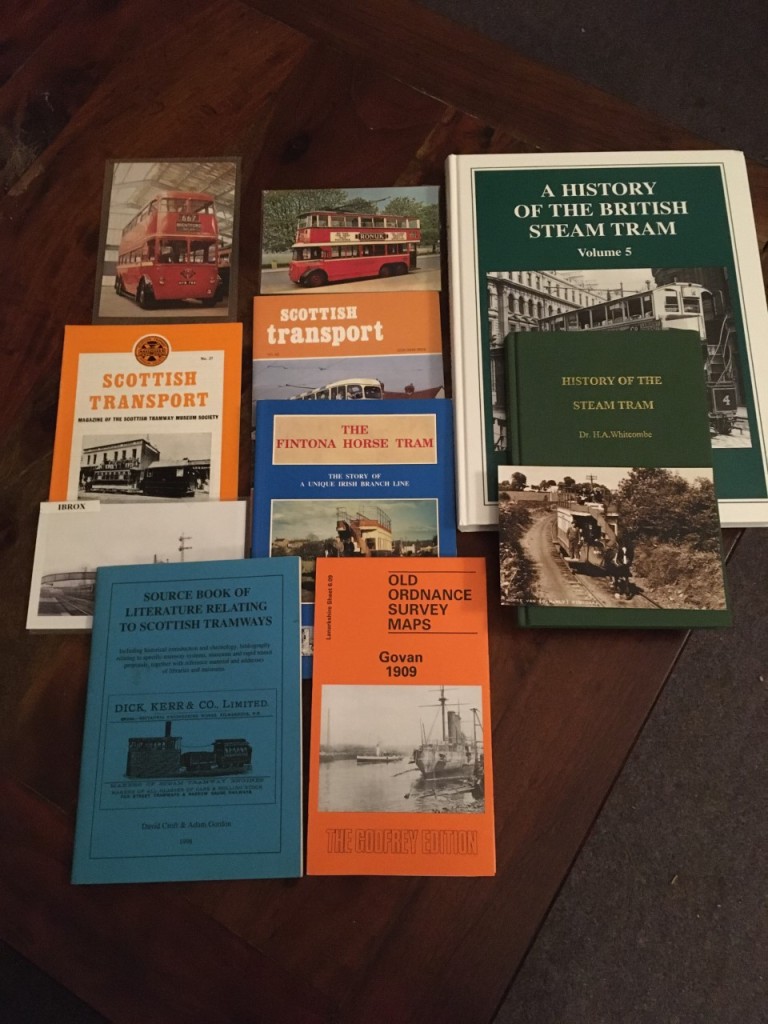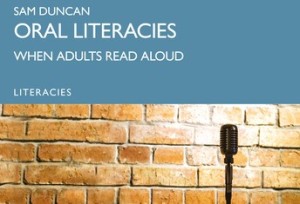Tadhail air Ghetto na Gàidhlig – Bella Caledonia
Powered by WPeMatico
Trusaiche blogaichean
Tadhail air Ghetto na Gàidhlig – Bella Caledonia
Powered by WPeMatico
Tadhail air Blog Pàrlamaid na h-Alba
Powered by WPeMatico
Chan eil cus chothrom agam a dhol air trèanaichean an-dràsta!
Cha robh mi air trèana sam bith am-bliadhna fhathast agus cha robh mi air trèana ach mu 5 tursan bhon Mhàirt 2020 uile gu lèir.
Ach tha mi air a bhith a’ dol air feadh an t-saoghail tro leabhraichean is bhidiothan agus tha an glasadh-sìos air leisgeil a thoirt dhomh beagan rannsachaidh a dhèanamh air rudan gu math faisg orm agus gus tòrr leabhraichean a cheannach air rudan a tha an dà chuid air an stairsneach agam fhèin agus gu math fad air falbh bhuam!
Seo na leabhraichean is cairtean-puist a tha mi air cheannach bho chionn ghoirid:

A chionn ’s nach urrainn dhomh Ghlaschu a Deas fhàgail an-dràsta, tha mi air a bhith a’ coimhead air na tha air fhàgail de slighean-trama, slighean bus-tràilidh agus seann rathaidean-iarainn air na cuairtean làitheil agam.
Tha mi ag obair air puist mu na leanas an-dràsta. Ma tha beachd sam bith agaibh leig fios – a bheil rud sam bith eile a bu toil leibh fhaicinn?
Alasdair
Tadhail air Trèanaichean, tramaichean is tràilidhean
Powered by WPeMatico
Tadhail air Blog Pàrlamaid na h-Alba
Powered by WPeMatico
Le Gordon Wells
 Following her major project on Reading Aloud, in which she included research on Gaelic as well as many other languages in England, Scotland, and Wales, Sam Duncan has now written a book about it. The title, “Oral literacies”, nicely encapsulates the challenge to many established orthodoxies around language and learning that Sam clearly, yet warmly articulates within its pages.
Following her major project on Reading Aloud, in which she included research on Gaelic as well as many other languages in England, Scotland, and Wales, Sam Duncan has now written a book about it. The title, “Oral literacies”, nicely encapsulates the challenge to many established orthodoxies around language and learning that Sam clearly, yet warmly articulates within its pages.
This is, in fact, the second substantial publication emerging from the project, following the special issue of Changing English last year which compiled a number of papers from the UCL symposium on the same topic. These included Gordon Wells’ paper on Island Voices, which focussed on the primacy of speech while freshly acknowledging the porosity of the boundary with written language.
While proponents of established language teaching regimes (and writers of census questions) may still find it appropriate to categorise linguistic behaviour in terms of a traditional “four skills” matrix, it’s refreshing to find research work which interrogates a rigid compartmentalisation of reading, writing, speaking and listening. Approaching, as she does, from a quite different perspective to that of Gaelic revitalisationism, it may nonetheless be significant for those engaged in the latter that “orality” features highly in Sam’s treatment.
And the book’s comprehensive index enables the selective reader to focus in on particular interests, such as Gaelic, psalm-singing, or indeed Island Voices!
Here’s the full back-cover description of the book.
This is the first book to focus exclusively on an examination of early 21st-century adult reading aloud. The dominant contemporary image of reading in much of the world is that of a silent, solitary activity. This book challenges this dominant discourse, acknowledging the diversity of reading practices that adults perform or experience in different communities, languages, contexts and phases of our lives, outlining potential educational implications and next steps for literacy teaching and research.
By documenting and analysing the diversity of oral reading practices that adults take part in (on- and offline), this book explores contemporary reading aloud as hugely varied, often invisible and yet quietly ubiquitous. Duncan discusses questions such as: What, where, how and why do adults read aloud, or listen to others reading? How do couples, families and groups use oral reading as a way of being together? When and why do adults read aloud at work? And why do some people read aloud in languages they may not speak or understand?
This book is key reading for advanced students, researchers and scholars of literacy practices and literacy education within education, applied linguistics and related areas.
There was an online launch at Lancaster University in early January, for which Sam wrote this blogpost:
The scholarship is meticulous throughout the book in its treatment of a fascinatingly wide-ranging and ambitious topic. Nonetheless, Sam’s writing style (of which the blogpost gives us an example) remains clear, approachable, and fundamentally humane – while pleasingly sprinkled with evocative surprises:
“… and in the background we might hear the sounds of Gaelic karaoke…”
The interested readership may well extend beyond the purely academic!
Tadhail air Island Voices – Guthan nan Eilean
Powered by WPeMatico
Bidh an ath choinneamh againn oidhche Dhiaordaoin sa tighinn (21 Faoilleach), 7.30f. Bidh Kenna Chaimbeul, Màiri Anna NicUalraig, Priscilla Scott agus Ainsley Hamill a’ tighinn thugainn le Bannal Frangag: Frangag Tholmach (1840-1926) agus na h-òrain a chruinnich i. Tha sinn a’ dèanamh fiughar mhòr ris a’ choinneamh seo agus gu mòr an dòchas gun urrainn dhuibh a bhith cuide ruinn. Chithear fiosrachaidh mu cheangal-lìn gu h-ìosal.
| Àm: | 7.30f, Diardaoin 21ᵐʰ dhan Fhaoilleach |
| Àite: | Coinneamh tro mheadhan Zoom. Facal-faire: ri thighinn |
| Cànan: | Gàidhlig |
Our next meeting will be on Thursday at 7.30pm when we will be joined by Kenna Chaimbeul, Màiri Anna NicUalraig, Priscilla Scott and Ainsley Hamill will be joining us (in Gaelic) on the theme of Frances Tolmie and her song collection.
| When: | 7.30pm, Thursday 21th January |
| Where: | Via Zoom meeting. Password: will be posted before the event |
| Language: | Gaelic |
Tadhail air Comann Gàidhlig Ghlaschu
Powered by WPeMatico
Tha iomairt a’ dol air adhart aig an àm seo gus Rathad-iarainn Srath Àfard (Alford Valley Railway) ann an Siorrachd Obar Dheathain ath-fhosgladh.
’S e rathad-iarainn caol-ghèidse a tha seo a tha a’ ruith bho sheann stèisean a’ bhaile tro raon goilf a-steach gu pàirc.

Tha an loidhne, a tha mu mhìle a dh’fhaidte, a’ tòiseachadh ann an stèisean a’ bhaile ach, an àite a bhith a’ dol air làrach na seann loidhne a dhùin ann an 1965, tha i air slighe gu tur ùr.
Dh’fhosgail an rathad-iarainn ann na 1980 agus thadhail mi air aon turas air ais ann 2011. ‘S e loidhne àlainn a th’ ann le seallaidhean brèagha agus tha i ri taobh Taigh-tasgaidh Còmhdhail Roinn a’ Mhonaidh cuideachd.
Nuair a chaidh mi ann, ge-tà, bha an loidhne ann an droch staid le lusan a’ fàs tron trac agus bha e follaiseach gun robh beagan TLC a dhìth air an loidhne. Smaoinich mi aig an àm gur dòcha nach maireadh an loidhne ro fhada – agus cha robh mi fada ceàrr oir dhùin i ann an 2017.
Gu fòrtanach, tha companaidh coimhearsnachd air an loidhne a ghabhail thairis agus tha iad air iomairt maoineachadh sluaigh a chur air bhog gus an stèisean a sgeadachadh. Gur math a thèid leotha!
Alasdair
Tadhail air Trèanaichean, tramaichean is tràilidhean
Powered by WPeMatico
Tadhail air Blog Pàrlamaid na h-Alba
Powered by WPeMatico
Le lasairdhubh

Sgrìobh Pádraig Ó Roidigh lèirmheas air Tinte na Farraige Duibhe (Air Cuan Dubh Drilseach) a nochd an-diugh anns an iris Nós, agus tha mi air mo dhòigh ghlan leis a’ bheachd aige oirre:
Úrscéal ficsean eolaíochta den chéad scoth é Tinte na Farraige Duibhe.
Ù hù!! Aibhiseach math! Leug an còrr an seo.
Tadhail air Air Cuan Dubh Drilseach
Powered by WPeMatico
Le Gordon Wells
 Rövid dokumentumfilm a Ceòlas skót-gael zenei nyári iskoláról, melyet a Skócia Nyugat Szigeteihez, a Külső Hebrdákhoz tartozó Dél-Uiston rendeznek meg minden évben.
Rövid dokumentumfilm a Ceòlas skót-gael zenei nyári iskoláról, melyet a Skócia Nyugat Szigeteihez, a Külső Hebrdákhoz tartozó Dél-Uiston rendeznek meg minden évben.
Hungarian becomes the nineteenth language in which an Island Voices film is featured, as part of our ongoing “Other Tongues” initiative.
We’re very grateful to László Horváth, a long time friend of the Gaelic language, for this kind and skilful contribution in his own mother tongue.
László teaches at Corvinus University and McDaniel College in Budapest, but he has been involved with Gaelic since he was 15 years old. He has attended several summer schools at Sabhal Mòr Ostaig, where he has lectured in Gaelic and made many friends. He has also written a series of Gaelic articles on Hungarian language renewal for the Gairm periodical. László is currently teaching his students in Budapest from Istanbul, where he is staying with his Turkish wife, Sinem. Still, somehow he managed to find time to send through to us a Hungarian version of the original commentary. Mòran taing, a László!
His chosen film is the documentary from the original Series One about the Ceòlas music summer school held annually in South Uist. It aims to integrate traditional music and dance in a community setting. It has strong links with tutors from Cape Breton in Canada, where old styles of Scottish fiddling and stepdancing have been maintained. The school attracts students from around the world.
As usual, a wordlinked Clilstore transcript – with the film embedded – is also available. You can find it here: https://multidict.net/cs/9092
Tadhail air Island Voices – Guthan nan Eilean
Powered by WPeMatico